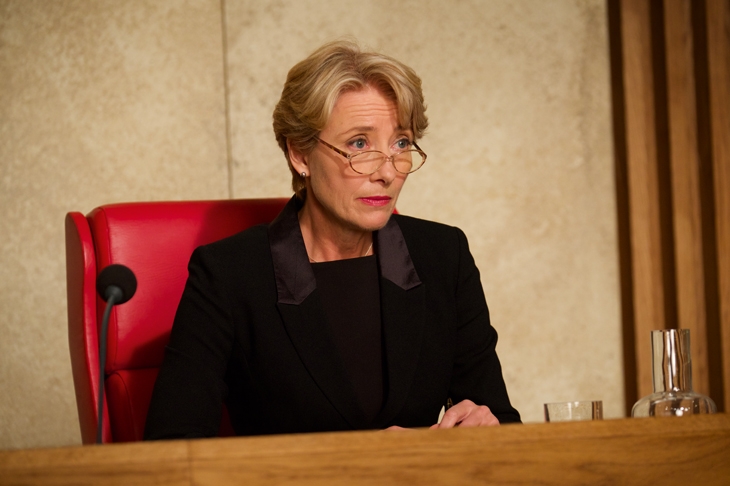The Children Act is the third Ian McEwan film adaptation in 18 months (after The Child in Time and On Chesil Beach), and if you’re minded to think no amount of Ian McEwan is too much Ian McEwan then you are wrong. This is very Ian McEwan: tasteful, restrained, high-minded, controlled. Once, fine. Twice, fine. But by the third time you will want to take all that tasteful, high-minded, controlled restraint and put a rocket under it. Or at least I did.
Directed by Richard Eyre, and adapted by McEwan, the film stars Emma Thompson, who is outstanding, and will keep you gripped to the extent that you can be gripped. She plays Fiona Maye, a judge in the family courts with a to-do list that will make your to-do list crumple up in shame. Put out the bins might be on yours, but on hers it’s what to do, for example, about the conjoined twins with parents who are refusing medical intervention. Fiona is clearly learned, dedicated and compassionate, fully capable of making such decisions wisely, but we know something will throw her off balance, if only because McEwan’s characters are always somehow thrown off balance, and here she’s thrown on two fronts.
She has a husband, Jack (Stanley Tucci), who is fed up of their passionless marriage and announces, in effect, that unless she bucks up he intends to have an affair. They haven’t had sex for 11 months, he complains, although if you’ve been married for 30 years or so, I have to say that sounds about right. They may even be ahead of the game. Tucci does the best he can with Jack, imbuing him with some vulnerability, when he could have been a total ass — can’t you see your wife’s work is hard and difficult? — but the character is scant and exists almost purely to throw that grenade into the room.
Meanwhile, on the other front, it’s the case of Adam Henry (Fionn Whitehead), a 17-year-old with leukaemia who is refusing a life-saving blood transfusion because he is a Jehovah. Even though we know what the law will do, and Fiona knows what the law will do — it was spelled out during the conjoined twins case — she opts to visit him at his hospital bedside, which did seem bizarre. He is, it turns out, precocious and poetic and has taught himself the guitar in just a few weeks (wasn’t it a violin in the book?) and she sings ‘Down By The Salley Gardens’ as he accompanies her. (Fiona is also into poetry and plays the piano, which means she is deeply cultural, and therefore worthwhile; that’s just how it works in McEwan world.) Fiona is blown away by Adam, and does not find him creepy, even though I rather did. I was, I should confess, quite hoping she would just let him die. (Go on, Fiona; go on!)
The film mostly deals with the repercussions of that meeting, with a third act that is as baffling as it was in the novel. Why does she invest in this boy? There are many high-minded themes at play here: faith vs science; the public vs the personal; the law vs family. But at the heart is this relationship with Adam which made no sense to me when I read the novel, and makes no sense to me now. Is it to do with her childlessness? Is this why her marriage is in trouble, essentially? If so, then Fiona is a misogynistic cliché, as what is the character saying: women must suffer if they’re to reach the top of their profession, and must pay with their marriages and wombs? (‘I’ve allowed the law to consume me,’ no man has ever said, but she does.)
Eyre keeps the camera mostly on Thompson’s face, which is not a criticism, as it’s a face that can say more about intelligence than any words could. But he also overly fetishises her well-off life and well-off home — a whole top floor in one of those magnificent buildings on Gray’s Inn Square — and always opts for good taste over drama. Fiona does have a breakdown of sorts, and there are tears, but it is a controlled, restrained breakdown, while you will be hankering for explosions of real energy and feeling and pain. You’ll want to put a rocket up it, in other words.






Comments